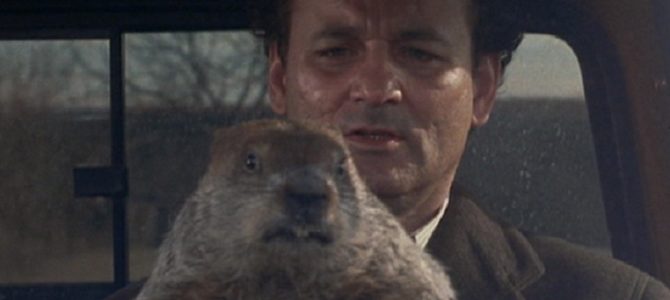
“Groundhog Day,” a seemingly light and whimsical 1993 comedy from director Harold Ramis, is 25 years old this year, and the film has had an interesting life. It debuted to generally positive but not reverential reviews, yet has since been accepted as a beloved classic with unexpected depths. The general response was summed up when Roger Ebert upgraded his review 12 years later from three stars to four. It seems he only came to appreciate it after repeated viewings—which, given the film’s premise, is kind of amusing.
You probably already know the idea behind the film. Saying that something is “like ‘Groundhog Day,'” meaning that the same experience is repeated over and over again, has become a figure of speech. Bill Murray plays Phil, a cynical big-city TV weatherman sent to Punxsutawney, Pennsylvania, to cover the Groundhog Day ceremony. He resents the assignment, and the town, and pretty much all of life and everybody in it, as being sappy and stupid and beneath him.
He moans through the whole thing, eager to escape Punxsutawney as soon as possible. But he wakes up next morning to discover that there is no next morning. He’s greeted by the same clock radio playing the same song—Sonny and Cher’s “I Got You, Babe,” because it had to be as annoying as possible—and everything around him is exactly the same and everybody goes through the same motions. He is forced to relive the same day over and over and over again.
If for some reason you haven’t seen the film, be warned that spoilers lie ahead. Given that it’s been out for a quarter-century and has become a watchword in the culture, I don’t think I have to worry too much about that. As you probably know, the ultimate resolution is that Phil has to live the same day over and over again until he gets it right. The interesting part is how he gets there.
How Phil Gets It Right
Initially, he responds with anger and denial, trying various ways to escape from the town and the day. Then he realizes that his knowledge of what’s going to happen, combined with a total lack of consequences to himself from one day to the next, gives him the power to get away with anything. He smokes and gorges himself, outruns the police, seduces a beautiful woman, and steals a bag of money from an armored car.
When these diversions cease to be entertaining, he devotes himself to the longer-term task of seducing his producer, Rita (Andie MacDowell), who is as sunny, wholesome, and optimistic as he is cynical and acerbic. We get a hilarious montage in which he repeats the same events with her, figuring out exactly what to say and do to seem like her ideal man. Yet he still strikes out every time, because it’s all an act, and what she really wants is sincerity.
After this failure, he becomes depressed and commits suicide, repeatedly. Each time he awakens again to Sonny and Cher. You can see how this would drive someone a little batty. Finally, he has a realization. He convinces Rita that he is repeating the same day endlessly, and she tells him, “Sometimes I wish I had a thousand lifetimes. I don’t know, Phil, maybe it’s not a curse. It just depends on how you look at it.”
So Phil sets out on a course of self-improvement. He takes piano lessons—one day at a time, of course—and learns to play Rachmaninoff. He reads poetry, learns French, becomes an expert ice sculptor. If this seems like a bit of a stretch, the point is that he has all the time in the world. Estimates of how much time he spends in the loop, based on what we see in the film, range from three years to 30 years to 10,000 years.
Finally, we get to see Phil live one perfect day. He delivers a moving Groundhog Day TV segment, citing Chekhov and meditating on the meaning of winter; he goes on a regular route through the town preventing tragedies (a child falling out of a tree, a man choking at a restaurant); he is the star performer at the town’s big evening celebration; he finishes the night talking with Rita and confessing his love for her. And then he is finally allowed to wake up on February 3.
Obviously, the premise of the film is not realistic and depends on some kind of magical or supernatural intervention—which is never explained, because it’s irrelevant. The function of a magical premise in fiction is to be a metaphor for something real. Director Harold Ramis has explained the idea he wanted to capture: that the one thing we all tend to repeat, day after day, is ourselves.
Always Miserable Because of Ourselves
Early in the film, Phil asks his drinking companions at a bar, “What would you do if you were stuck in one place, and everything that you did was the same, and nothing mattered?” One of them replies, “That about sums it up for me.” But you don’t have to be a sadsack barfly for this to apply to you. It certainly applies to Phil before he gets caught in his Groundhog Day loop.
The weather may change every day, his surroundings may change, people may come into and move out of his life, but he will always be miserable because he is always the same. It is only when he is deprived of the ability to change his outward circumstances that Phil turns to the real work of changing himself, and he is only able to move on from his purgatory of endless repetition when he becomes a different and better person.
What makes the film so profound is that each of the stages Phil goes through reflects a real psychological trap that people get struck in during their own personal version of endless repetition: denial and the struggle for escape from reality; the attempt to relieve boredom with short-term schemes; going through the motions of what somebody else expects them to be in the hope of acceptance; self-destructive despair and depression. These are all of the things people go through before discovering, if they discover it, that what they really need is to use their time to learn and grow.
A friend of mine referred to Phil’s attempts at self-improvement as “long-range planning in a single day.” In one respect, Phil’s dilemma imprisons him in the short term. Nothing that he does or builds will last beyond the day. In another respect, it gives him a boundless long term: he has all the time he wants to accomplish anything, so long as he can take it with him as part of his mind and character. So it’s not so much that Phil relives the same day until he gets it right. He relives the same day until he gets himself right.
The lesson is that the keys to happiness in the very long term and in the immediate short term are the same. Most of us pursue projects and goals that go beyond a single day, that take years or decades to come to fruition. But those goals will eventually be completed (or not; we don’t always have control over how they turn out), and we will move on from them. What remains constant from goal to goal is same thing we have in every moment of every day: who we are, our mind and values and character.
In the guise of a screwball comedy, “Groundhog Day” delivers the same profound message Milton gave us in “Paradise Lost”: “The mind is its own place, and in itself can make a Heaven of Hell, a Hell of Heaven.” There’s a lot of truth in that, even if he wrote into the mouth of Satan—and even if you end up getting it from another unlikely source, such as Bill Murray.









